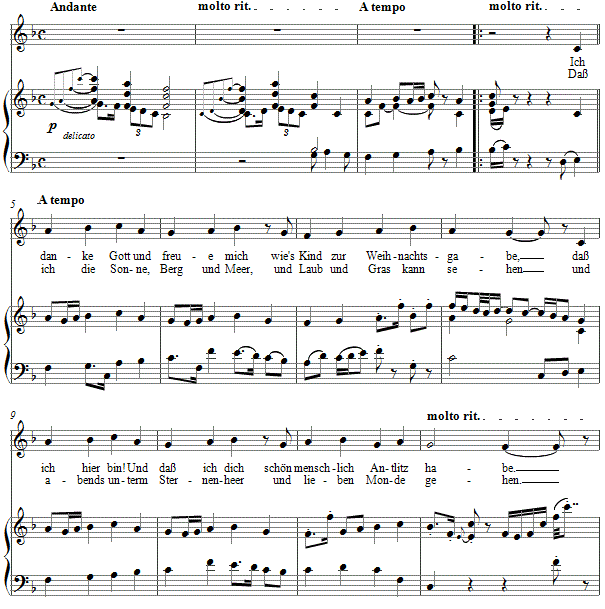Music and Texts of GARY BACHLUND
Vocal Music | Piano | Organ | Chamber Music | Orchestral | Articles and Commentary | Poems and Stories | Miscellany | FAQs
Täglich zu singen - (2012)
Matthias Claudius
for medium voice and piano
Ich danke Gott und freue mich
Wie's Kind zur Weihnachtsgabe,
Daß ich hier bin! Und daß ich dich
Schön menschlich Antlitz habe.
Daß ich die Sonne, Berg und Meer,
Und Laub und Gras kann sehen
Und abends unterm Sternenheer
Und lieben Monde gehen.
Ich danke Gott mit Saitenspiel,
Dass ich kein König worden;
Ich wär' geschmeichelt worden viel
Und wär' vielleicht verdorben.
Gott gebe mir nur jeden Tag.
So viel ich darf zum Leben,
Er gibt's dem Sperling auf dem Dach;
Wie sollt' er's mir nicht geben!2 pages, circa 2' 10"
Matthias Claudius
I thank God and rejoice,
as does a child at gift-time on Christmas,
that I am here! And that I have you,
such a lovely human face.
That I can see the sun, mountain and sea,
and leaves and grass;
and that in the evening under an army of stars
and a lovely moon, I can walk.
I thank God with music-making
that I have never been king;
I would have been flattered much,
and perhaps corrupted.
God grants me only every day.
So much I may enjoy in life,
he gives the sparrow on the roof;
why should he not give it to me?
Translation from German to English copyright © by Emily Ezust
The Lied, Art Song, and Choral Texts Archive
The notion of simple gratitude seems to often escape the modern habits of secular thought which emphasize psychological belief systems and political orthodoxies on the one hand and basic human hedonism and narcissism on the other. The penchant to cast one's self persistently in the role of victim of some group or "ism" is an example of this, in which the favored modern stance of "outrage" suffocates gratitude. Such frames and habits of mind seem to me essentially negative prayers, employing the term across categories and disciplines. But gratitude pays dividends so often, which modern life forgets.
Gratitude is a remarkable gift to the heart, whether expressed in prayer marked by denominations and creeds, or in awe at the cosmos and man's place in it. Finding one's self fortunate in circumstances when compared to those less fortunate is one such expression of gratitude. Simple wonder at our own tendency to health in the face of illness is another, as we survive another day and another year. From prayer to meditation, such are positive expressions. Matthias Claudius' sweet four strophes are a prayer, and addressed to God while referencing the Christian tradition. A more general understanding can extrapolate this to a gentle, child-like gratitude. But it it a gratitude for the most fundamental and enormous things, from senses to music to life itself. For other settings to texts of Claudius, click here.
The setting is simple, lightly decorated with notated ornamentation. The melody for the first four strophes is identical, the third strophe inverting the accompaniment's lines, and the last strophe varies the melody slightly to make a final reassertion of gratitude in the form and argument of the question.
The score for Täglich zu singen is available as a free PDF download, though any major commercial performance or recording of the work is prohibited without prior arrangement with the composer. Click on the graphic below for this piano-vocal score.

